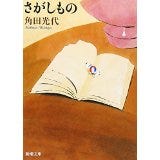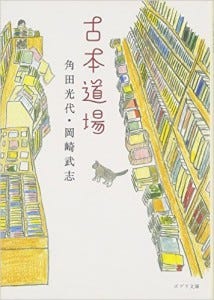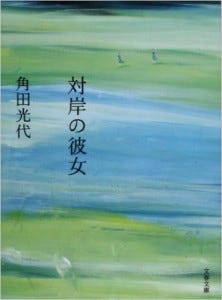Living Books

「さがしもの」
角田光代
新潮社, 2005
Sagashimono, by Mitsuyo Kakuta
Shinchosha, 2005
[not available in English translation]
The title of this book of short stories, 「さがしもの」, literally means “something missing,” or “something one is looking for.” I initially thought of translating it as “Lost and Found”—those dim corners in school basements where children’s lost sweatshirts and lunchboxes pile up—but this would be misleading. The characters in these stories do not usually find what they are looking for, but perhaps find something different instead. If they do find what they were seeking, they usually no longer need it in the same way, and have gained something else in the search.
The first story, 「本の旅」(A Book’s Journey), is worth summarizing in detail because it includes many of the themes that run through the stories in this collection. The main character in this story (we never know her name) goes to Tokyo for university, living by herself for the first time. Quickly discovering that the allowance her parents send her quickly disappears on beers and movie tickets, she decides to sell her books and records to a bookstore. The bookstore owner, sitting on an elevated platform and using an abacus for his sums, stops short at one book, looks sharply at her, and asks her if she really wants to sell it. It wasn’t a first edition, nor was it out of print, just a novel in translation that could be found in any large bookstore.

[I imagined the bookstore looked something like this (image found here).]
She asks if it is valuable, but the bookstore owner shakes his head emphatically and tells her, “You don’t ask other people whether something has value, you decide that yourself.” She sells the book anyway, and by the time she had graduated college, she’d already forgotten this episode.
After graduation, she travels to Nepal by herself. On a rare rainy day in Pokhara, she visits a used bookstore, where books sold by travelers from all over the world are piled up on shelves. Nothing is separated by language or genre, but all jumbled up, with a German translation of “Around the World in Eight Days” next to a thick paperback in Italian, next to a Thai cookbook and the Lonely Planet guide to Tibet. She notices Japanese books too—a tattered copy of a book by Kobo Abe next to a Stephen King novel, a brand new Shusaku Endo novel next to a Chinese book with unrecognizable kanji. Then she is caught up short as she glimpses a familiar title from the corner of her eye. Stuck between the Lonely Planet guide to Mexico and a French translation of “Mother Goose”, she finds the book she had sold in her first year of college.
She is sure it can’t possibly be the same book, but she checks the last page, and finds the letter “K” and a small picture of a flower, which she herself had drawn to mark her books. There are enough Japanese tourists in Pokhara that it’s not impossible that one of them had bought this book in Tokyo and brought it here on their travels. She decides to buy it because it must be fate, and besides, she realizes that she has forgotten more than half of the story.
Reading it later, she finds that not only has she forgotten most of the story, she’d completely misunderstood the storyline: this was not a coming-of-age story describing the calm passage of days, but a tense mystery. And through the words, she catches sight of her teenage self, someone who didn’t know that a country named Nepal even existed, and who had never experienced love. She sells the book on again to a backpacker in Kathmandu.
She finds the book again in a bookstore in Ireland. She goes in to kill time, observing that bookstores all over the world have the same smell—“a smell leftover from the rain a few days earlier, the smell of words soaking up the silence, that deeply familiar smell.” She had so completely forgotten finding the book in Nepal that she didn’t make the connection when she saw the book again, but there it was, with her mark on the last page.
Feeling as if she is in a dream, she buys the book and reads it in a pub. She realizes that the story has changed again. She had remembered it as a mystery, but instead, here was a quiet story weaving together fragments of daily life. She had recalled a slipshod writing style characteristic of a young writer, but instead the sentences were stripped away to their essence, leaving a concise beauty. And then she realized that the book had not changed, she had changed. She had experienced love with all of its messy aftermath, lost friends and found new ones, learned how to come to terms with difficult situations and accept what she couldn't change. This had changed the book’s meaning.
As the book seemed to want to travel with her, she decided to sell the book again in London on her way home from Ireland.
Just as the main character in 「本の旅」(A Book’s Journey) glimpses her teenage self behind the words of her book, in 「だれか」 (Someone), the main character envisions an entire life between the pages of her book. Ill from a bout of malaria, she lies in a bed on a small island in Thailand and reads books left behind by other tourists. As she reads a book by Yoshio Kataoka, she imagines the man who had left the book in Thailand—every detail of his life, from his empty job to the pizza boxes piled up in his bare apartment to the girlfriend who sweeps in and cleans up the pizza boxes and then leaves him. He might be wearing a suit in an office somewhere, but his doppelganger was still here in Thailand. She imagines passing him as they cross the Shibuya Station intersection, neither one knowing of their connection.

Shibuya Crossing; photo by Les Taylor
In 手紙 (The Letter), a woman goes to the coast to stay in an inn by herself after a quarrel with her boyfriend. She finds a book of poems by Richard Brautigan, and remembers reading them when she was about 20 and saw herself in his loneliness. Now she reads them again and sees a self-imposed loneliness, someone who has shut himself behind a fence he put up himself and then whines about his solitude. Here is Kakuta’s recurring theme: books change as we do.
I think 「彼と私の本棚」 (My Boyfriend and My Bookshelves) was my favorite story in this collection, although it’s hard to pick just one. The story starts as a woman is sorting through books, dividing her books from her boyfriend’s now that he has met someone else. (I particularly liked that when he tells her he has met someone else, her first question is whether this other girl reads; she doesn’t.) When they had first moved in together, the only furniture they bought was a bookshelf. Once that was full, they bought another, and once their room became too cramped, they moved.
As she’s unpacking her books in her new apartment, she starts remembering the conversations they had had about books, and the way she has volumes 12-22 of a manga, while her boyfriend has volumes 1-11 and 23 to the end, and how they had both snuck off to cry when reading volume 15. They had used the same bookshelf and read the same books, leaving them with the same memories, so that even though these books had been forcibly separated, she is comforted to think that she and her former boyfriend carry the same memories of them.
In「不幸の種」(Seed of Unhappiness), the main character blames a spate of bad luck on a book that has appeared on her shelves. After consulting a fortune teller, she gets rid of the book for a few years, but when she gets it back and actually reads it, she has a realization: “The meaning of this old, difficult book that came out of nowhere changes as I get older. The meaning changes when something sad happens, when I have a new relationship, and then again when I’m worried about the future.”
「引き出しの奥」(The Back of the Drawer) will stay with me for a long time. Shino is a university student who sleeps with any man who takes her out, and has gained a reputation for it. It’s not that she wants to sleep with these men; she just doesn’t know how else to thank them. She hears from one of these men about a “mythical book” that makes its way around all the used bookstores near campus. There’s nothing special about the book, but on the back pages, people have written phrases like “the smell of curry in the alley early on a summer afternoon” and “at 6pm, the light in the opposite apartment was flickering.” Exactly what these phrases mean is not clear, but when Shino talks to a classmate about the mythical book, they speculate that the writers are describing their first memories, or their most important memories, or maybe the time when they were most content. They decide to look for the book, and Shino stops sleeping around, because she realizes she hasn’t had moments like that yet, and she wants to know just what to write if she ever finds the book.

Map of bookstores near Waseda University; the numbers all indicate bookstores, lining both sides of the street
「ミツザワ書店」(Mitsuzawa Book Store) concerns a young man who has just won a literary prize for his first novel, and decides to finally apologize for stealing a book when he was younger. This bookstore was run by an elderly lady who seemed more interested in reading her stock than in running a business. When the narrator was a kid, he had seen the bookstore as a kind of library of all the books in the world. The descriptions of the bookstore itself were wonderful.
In the title story, 「さがしもの」(The Search), a young girl’s dying grandmother sends her on a search for a book, a collection of essays long out of print. She continues searching for this book for years, even after her grandmother has died, gradually expanding her search from large city bookstores to used bookstores in the country. She finally finds it years later when she’s not even looking for it and understands why her grandmother had wanted it. She becomes a book concierge, making very little money but helping people find books.
The last story, 「初バレンタイン」 (First Valentine), was so good at portraying a young girl’s trepidation at giving her first real boyfriend her favorite book—a book that she feels has changed her life—that I was nervous for her too. And I was crushed when she realizes that he would have preferred to have a box of chocolates like everyone else.
Mitsuyo Kakuta sees books as living beings, suddenly appearing in our lives but just as liable to disappear. Their meanings change over time as we do, so that they come to encompass all of our previous incarnations.

Her love of bookstores also comes through in her vivid descriptions of the bookstores her characters visit. In fact, she has written a book,「古本道場」, with Takeshi Okazaki (岡崎武志) about used and antiquarian book stores.
Kakuta has written over 40 books, very few of which have been translated into English. (I can only find two—both out of print—and some short stories available in digital format.) She won the 132nd Naoki Prize in 2004 for her book 「対岸の女」, which has been translated as The Woman on the Other Shore (published in 2007).



